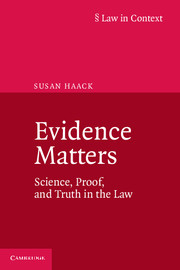Book contents
- Frontmatter
- Epigraph
- Contents
- Acknowledgments
- Introduction: A Pragmatist Perspective on Science, Proof, and Truth in the Law
- 1 Epistemology and the Law of Evidence
- 2 Epistemology Legalized
- 3 Legal Probabilism
- 4 Irreconcilable Differences? The Troubled Marriage of Science and Law
- 5 Trial and Error
- 6 Federal Philosophy of Science
- 7 Peer Review and Publication
- 8 What’s Wrong with Litigation-Driven Science?
- 9 Proving Causation
- 10 Correlation and Causation
- 11 Risky Business
- 12 Nothing Fancy
- Cases Cited
- Statutes, etc., Cited
- Bibliography
- Glossary
- Index
- References
5 - Trial and Error
Two Confusions in Daubert
Published online by Cambridge University Press: 05 August 2014
- Frontmatter
- Epigraph
- Contents
- Acknowledgments
- Introduction: A Pragmatist Perspective on Science, Proof, and Truth in the Law
- 1 Epistemology and the Law of Evidence
- 2 Epistemology Legalized
- 3 Legal Probabilism
- 4 Irreconcilable Differences? The Troubled Marriage of Science and Law
- 5 Trial and Error
- 6 Federal Philosophy of Science
- 7 Peer Review and Publication
- 8 What’s Wrong with Litigation-Driven Science?
- 9 Proving Causation
- 10 Correlation and Causation
- 11 Risky Business
- 12 Nothing Fancy
- Cases Cited
- Statutes, etc., Cited
- Bibliography
- Glossary
- Index
- References
Summary
[U]nder the [Federal Rules of Evidence] the trial judge must ensure that any and all scientific testimony or evidence admitted is not only relevant, but reliable…. The subject of an expert’s testimony must be “scientific … knowledge.” The adjective “scientific” implies a grounding in the methods or procedures of science…. [I]n order to qualify as “scientific knowledge,” an inference or assertion must be derived by the scientific method…. “Scientific methodology today is based on generating hypotheses and testing them to see if they can be falsified; indeed, this methodology is what distinguishes science from other fields of inquiry.”
–Daubert v. Merrell Dow Pharmaceuticals, Inc. (1993)After Mrs. Daubert had taken Bendectin for morning-sickness in pregnancy, her son Jason was born with severe birth defects. Believing that Bendectin was the cause, in 1989 the Dauberts brought suit against the manufacturers of the drug, Merrell Dow Pharmaceuticals. At trial, however, the court excluded the expert witnesses the Dauberts had proffered to testify on the question of causation, on the grounds that the consensus in the relevant scientific community was that Bendectin does not cause birth defects. With the plaintiffs’ causation experts excluded, there was no case to answer, and the trial court granted summary judgment in favor of Merrell Dow; the appeals court affirmed.
- Type
- Chapter
- Information
- Evidence MattersScience, Proof, and Truth in the Law, pp. 104 - 121Publisher: Cambridge University PressPrint publication year: 2014
References
- 2
- Cited by



